I’m pretty sure Gradius is one of the first shooters I’ve ever played. I’m sure that statement applies to a legion of gamers as well. There were plenty of multiplayer focused shmups on the Atari 2600 like Combat but none that resembled Konami’s classic. Whether intentional or not on some subconscious level I’ve compared almost every title in the genre since then to Gradius and to be honest that is a little unfair. There are so many innovative features packed into this one simple game that you wonder how any other title can compare. Gradius is a classic and the NES port is a good representation of the original arcade game.
Gradius is quite possibly the most influential shooting series of all time. The only other series that might come close would be R-Type and I would place that at a distant second. You’ll be hard pressed to find many games in the genre that don’t borrow from it in some way. Although its lead to a legion of derivative games those same titles were average or better for copying Gradius’ mechanics. This first installment is solid but a bit bare bones and hard to go back to due to just how far the genre has come but it is at least still fun.
The unique power-up system is what helped the game rocket to fame. Rather than a series of static weapons the item grid offers a range of weapons to select once you have the appropriate number of capsules. The list wasn’t new but it all came down to how it was presented. First speed, then missiles, the useless double shot, the powerful laser, options, and a shield. The options might be the most copied game mechanic in history and it’s easy to see why; a phantom object that mimicked your actions is beyond cool and you would have to be a damn fool not to copy it in some form if you made a shooter. Sadly the NES version only allows two to the arcade’s four but that doesn’t diminish their impact in any capacity.
The weapon system was innovative not just in how it was set up but also in how it changed your approach to the game. The list of weapons isn’t anything new as plenty of titles had extra speed, missiles, and lasers yet you were at the mercy of where the designers placed them in each level. With this system you could prioritize which weapons you wanted first which lead to a unique experience and challenge for everyone. Going for options before gaining or the laser left you potentially weak for good while and was dangerous. Meanwhile a slow ramp up was the optimal approach. The beauty of it is that any style was viable as long as you had the skill to back it up.
Gradius is composed of seven levels although the game’s first half isn’t very varied. The outer space and rock theme is shifted only slightly in the initial stages and even repeated; the fourth stage is merely the first flipped upside down. The Moai stage introduced the Easter Island statues to many and are almost as iconic as the series weapon system. Later in the game things become more varied as you approach the Bacterion Empire’s base and the levels become more organic. The presentation is the weakest link despite being solid.
One area that tends to avoid any recognition is the pacing. Each level in Gradius follows a similar track. You have the initial space segment leading to the next thematic level. There are numerous grouped waves of enemies to gain power-ups if needed. Next is the actual stage itself with whatever level specific enemies and obstacles to hinder your progress. Then finally comes the boss. This is the game’s weakest element as the Big Core, regardless of its iconic status, is the game’s lone boss until the end. No matter how fast it gets it is still incredibly repetitive.
This is a game of highs and lows when it comes to difficulty. When fully powered up you can easily blow through most levels in under two or three minutes. Yet this is tempered by the fact that all it takes is one stray bullet to end your run. Death sends you back to a checkpoint, a feature that Gradius pioneered. It also means you are left with no weapons and must mount a comeback against near impossible odds. The later stages such as the Moai level pepper the screen with fire causing heavy slowdown and flicker which might lead to a cheap death. Overall Gradius was pretty tough but is also where a generation of gamers cut their teeth. The skills we developed tackling this beast would carry over to nearly every game in the genre.
In Closing
There are very few games as influential as Gradius in their respective genre. Even after all these years it remains a solid game and one that is immediately accessible which is rare. While there are plenty of games I would recommend first that isn’t a mark against Gradius. It simply has way too much competition.



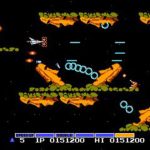

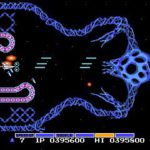
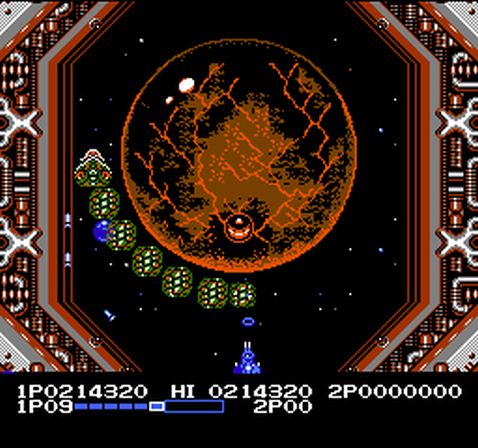
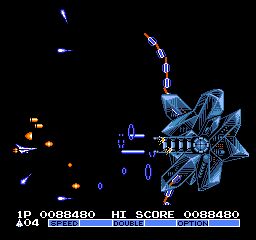
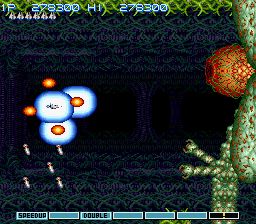
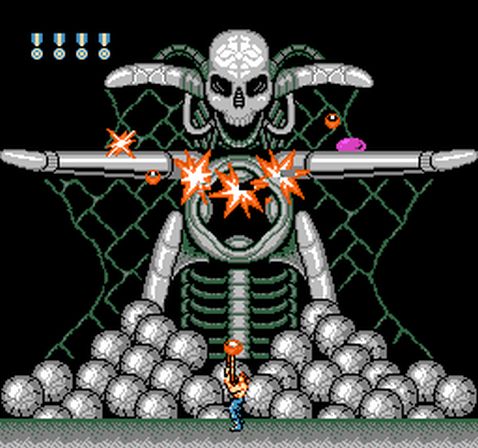
3 thoughts on “Gradius”